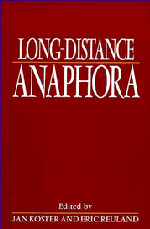Book contents
- Frontmatter
- Contents
- List of contributors
- Preface
- 1 Long-distance anaphora: an overview
- 2 Containment and connectedness anaphors
- 3 Long-distance reflexives and the typology of NPs
- 4 Contextual determination of the anaphor/pronominal distinction
- 5 On the interaction between antecedent-government and binding: the case of long-distance reflexivization
- 6 Binding in Polish
- 7 Anaphors in binary trees: an analysis of Czech reflexives
- 8 Latin long-distance anaphora
- 9 Prepositions, binding and θ-marking
- 10 Locality, parameters and some issues in Italian syntax
- 11 Long-distance binding in Finnish
- 12 The primacy condition of anaphora and pronominal variable binding
- 13 The local nature of the long-distance reflexive in Chinese
- 14 Anaphors and logophors: an argument structure perspective
- References
- Index
12 - The primacy condition of anaphora and pronominal variable binding
Published online by Cambridge University Press: 01 June 2011
- Frontmatter
- Contents
- List of contributors
- Preface
- 1 Long-distance anaphora: an overview
- 2 Containment and connectedness anaphors
- 3 Long-distance reflexives and the typology of NPs
- 4 Contextual determination of the anaphor/pronominal distinction
- 5 On the interaction between antecedent-government and binding: the case of long-distance reflexivization
- 6 Binding in Polish
- 7 Anaphors in binary trees: an analysis of Czech reflexives
- 8 Latin long-distance anaphora
- 9 Prepositions, binding and θ-marking
- 10 Locality, parameters and some issues in Italian syntax
- 11 Long-distance binding in Finnish
- 12 The primacy condition of anaphora and pronominal variable binding
- 13 The local nature of the long-distance reflexive in Chinese
- 14 Anaphors and logophors: an argument structure perspective
- References
- Index
Summary
Introduction
It has been known for some time that the primacy condition of anaphora assumed in standard binding theory, requiring c-command of the anaphor by the antecedent, is insufficient in non-configurational languages, in which coarguments mutually c-command each other (cf. É. Kiss (1981), Hale (1983), Mohanan (1983–4), Marácz (1986)). The c-command condition of anaphora is also inadequate in certain constructions of configurational languages, e.g. English. Among other inadequacies, it is too permissive in licensing anaphoric relations between coarguments occupying hierarchically equally prominent positions.
As this chapter will point out, the standard c-command condition on binding is also insufficient in licensing pronominal variable binding. Its failure is, again, most extensive in non-configurational languages, but the constraint also breaks down in various constructions of configurational languages.
This chapter proposes a primacy condition of binding which adequately constrains both antecedent–anaphor relations and operator–pronominal relations in configurational and non-configurational languages alike. The proposed primacy condition involves three interacting primacy principles: S-structure c-command, S-structure precedence, and precedence in a thematically motivated lexical argument hierarchy.
Anaphor binding
Principle A of the binding theory formulates the following requirement for anaphors:
(1) An anaphor is bound in its governing category.
(See Chomsky (1981), and, for a more complex formulation of the locality condition of anaphora, Chomsky (1986a).)
The primacy condition of anaphora is specified in the definition of the term ‘bound’:
(2) a is bound by b iff a and b are coindexed, and b c-commands a.
- Type
- Chapter
- Information
- Long Distance Anaphora , pp. 245 - 262Publisher: Cambridge University PressPrint publication year: 1991
- 1
- Cited by



